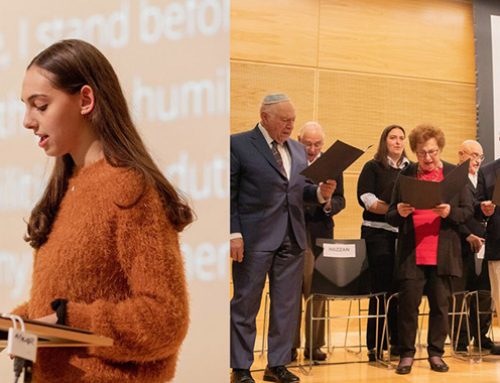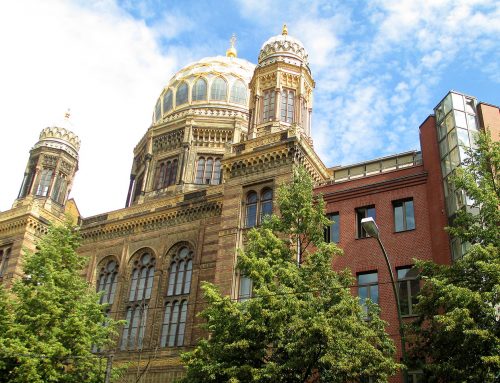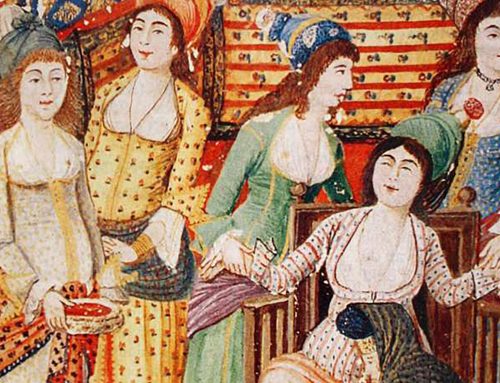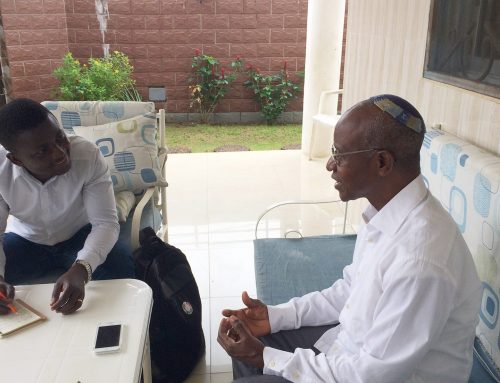
A meeting of the senior club at the JCC Krakow, including their honorary member, Sławek Pastuszka (seated on the right), interviewed by Denise Grollmus for the Sounds Jewish Podcast.
Editor’s Note: On June 3rd, Denise Grollmus, one of our 2013-14 Jewish Studies Graduate Fellows, was awarded the prestigious Sandford St Martin Trust Award for her podcast, “Sounds Jewish: The Jewish Revival in Poland.” This blog post by Denise describes her process of researching the revival and creating her award-winning podcast for the Guardian. The UW Stroum Center for Jewish Studies congratulates Denise on her achievement!
I had been living in Warsaw, Poland for seven months when I got the phone call. Sarah Peters, a former BBC radio producer who now makes podcasts for The Guardian, had read a story I’d written for Tablet Magazine about Poles discovering their Jewish roots and converting back to the religion that their ancestors had left behind, sometimes generations earlier and usually out of fear of anti-Semitism. There was a chance, she said, that she was coming to Poland to do a story on the subject and she wanted me to tell her more.
As we talked for nearly an hour about adult Hebrew schools and contemporary Polish perspectives on the Jews, Sarah asked how and when I’d become interested in this topic. That’s when I had to admit that my investment wasn’t purely academic or journalistic. It was personal. Like many of the Poles I’d been interviewing, I, too, had stumbled across my own Polish Jewish roots late in life. My maternal grandmother, who had been born and raised in Warsaw, Poland, had gone into hiding, changing her name and her identity, so that she could survive the war. Even after the war was over, she decided to keep her Jewish identity a secret from our family until I was nearly 30 years old. Ever since I’d discovered the truth, I’d been obsessed with my family history, the history of the Polish Jews, and the revival of Jewish life in Poland, where I found a community of people just like me. That’s also how I’d found myself living in Warsaw on a Fulbright grant, too.
When I was done talking, the line went silent. I could practically hear Sarah thinking, until she broke the silence and said, “you should present the podcast. You should tell it through the lens of your family’s story.” Flattered, I immediately agreed to do the piece for Sounds Jewish, a podcast series hosted by The Guardian and funded through the JCC of London. “Good,” Sarah said. “I’ll see you in a couple weeks.”

Director of the JCC Krakow, Jonathan Ornstein, along with JCC member, Sławek Pastuszka, who were both interviewed for Denise Grollmus’s podcast.
We met in Krakow, where we worked 15-hour days interviewing everyone who was willing to speak to us, and then headed to Warsaw to do the same. When we had more than 30 hours of audio, Sarah flew back to London and we spent the next two months shaping what we had into a 42-minute piece. All of our material was fascinating and it was difficult deciding what should go and what should stay when it felt like all of it should be heard. Still, the process of distilling such a complicated and moving story into a digestible and emotional piece that would connect with a variety of listeners was a truly rewarding experience through which I was able to process all that I had been thinking about over the past nine months.
Our piece was posted online on June 5, 2013—the same week that The Guardian was making waves for its reporting on Edward Snowden. You can access the podcast here. Even in the shadows of such huge breaking news, I was extremely proud of what we’d made and I was glad that it was in the world so that anyone could hear it. A month later, I returned to the United States, where I moved to Seattle to begin my PhD in English at the University of Washington. As the insanity of grad school sucked me in, it often felt like my time in Poland had been a dream.
Then, this March—almost a year to the day that she first contacted me—Sarah reminded me that it wasn’t. Our podcast had been shortlisted for a prestigious award in the UK, she wrote. The Sandford St. Martin Trust, an organization dedicated to promoting “thought-provoking, distinctive programming that deals with religion, ethics and spirituality,” according to its website, had added our piece, along with four others, to its list of the year’s best podcasts. I was floored. An award nomination is not what I had expected. The process of doing the podcast felt like reward enough. Still, it was reaffirming that someone recognized the hard work that Sarah and I did over those three magical months.
Two weeks ago, the Stanford St. Martin Trust officially released its list of candidates for this year’s awards, which will be handed out on June 3 at Lambeth Palace, the official residence of the Archbishop of Canterbury. Since receiving the news, I’ve re-listened to our podcast. Hearing the voices of all the amazing people that gave us their time and their stories fills me with both gratitude and pride. I feel lucky to have something like it, not only as a profound memory cast in sound, but also as something I can share. Feel free to listen or to read more on what I discovered while living in Poland.






Leave A Comment